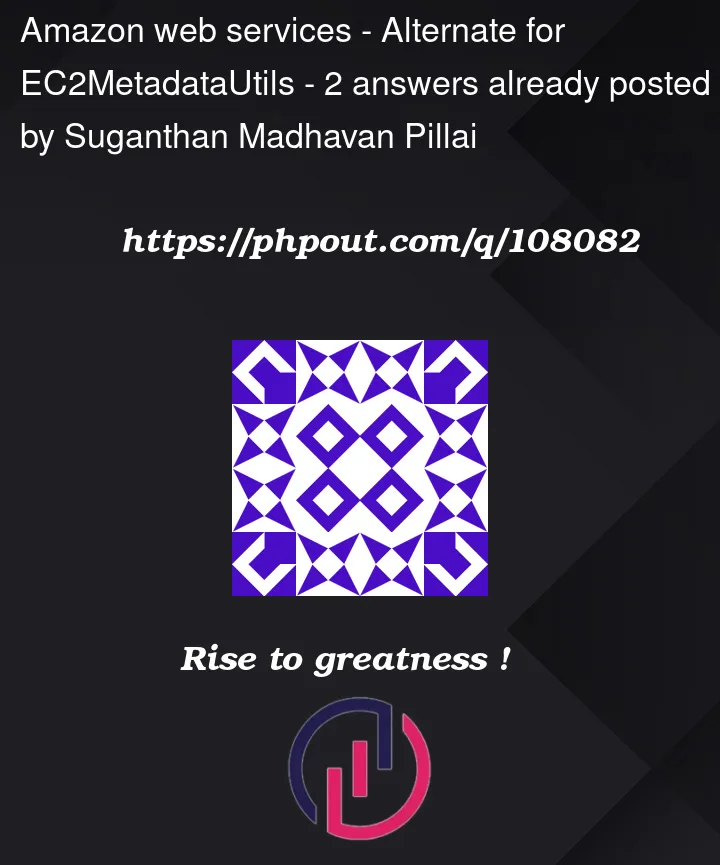In our code, to get the ec2 instance’s region we are using EC2MetadataUtils.getEC2InstanceRegion(), and we just realized we must not use EC2MetadataUtils because it is an internal API that is subject to change.
Note: this is an internal API subject to change. Users of the SDK should not depend on this.
Did some google searches but was unable to find an alternate solution, Is there any alternative solution available to get the ec2 instance’s region?
Thanks for any help!




2
Answers
This is the implementation of the
class: https://github.com/aws/aws-sdk-java/blob/master/aws-java-sdk-core/src/main/java/com/amazonaws/util/EC2MetadataUtils.javaI have found no Java alternative for this, despite searching on google, so, I have realized that a deeper research is needed. I describe the possibilities that you have as follows:
1. You can leave this as it is
The warning clearly suggests that it’s a good idea to use an alternative, but the nonexistence of a ready-made alternative and possible goodies of future versions of the
classare good counter-arguments, so you can ignore this note for now.2. You can download the open-source library and search for calls of this method
If you find the calls for this method somewhere else in the library and you are able to somehow use it instead, then that may be an alternative. For instance, after cloning with
and searching for occurrences of this method with:
I have got these results:
The first match is the definition of the method.
The second match looks like this:
So, it seems that the
getRegionmethod ofInstanceMetadataRegionProviderlooks like the alternative that you were looking for.The third match looks like this:
So,
getCurrentRegionatRegionslooks like another alternative. If you manage to use one of these for your purpose successfully, then it will be easy to refactor and it also makes sense to refactor accordingly.3. Copy and rename the class
If the first two options are unfeasible for you, then you can copy and rename the
class, so you will be able to make sure that this method will remain unchanged even if the internal API is changed. This is not a very elegant approach and it is not easy to implement either, as theclasshas dependencies, so, as a result, you will have some difficulties to resolve, but we know in advance that this is a possible solution.4. Finally the do-it-yourself approach
This is an article about retrieving instance metadata: https://docs.aws.amazon.com/AWSEC2/latest/UserGuide/instancedata-data-retrieval.html
As we can see, among the metadata information of the instance, you can find the region: https://docs.aws.amazon.com/AWSEC2/latest/UserGuide/instancedata-data-categories.html
A command example that uses curl and jq that looks like
can be found here: https://www.howtouselinux.com/post/find-ec2-instance-region-info-in-aws
The region information in which the EC2 instance is running is provided as part of the instance identity document.
As explained in the AWS documentation and pointed out as well by @LajosArpad in his very good answer, this information can be obtained from the following URL from inside the EC2 instance, running
curl, for instance:The response provided will be similar to the following:
Please, note the
regionfield.EC2MetadataUtilsbasically, of course, with more detail, and in a more structured way, is reading this information as well to give you the EC2 region in which the instance is running.You could try reproducing a minimal version of the functionality exposed by
EC2MetadataUtilsin your own code.The exact way will depend on the libraries you want to use to perform the task but, independently of them, you will need to read the returned document, parse it as JSON, and get the
regionfield.For instance, using the standard Java API for JSON processing, and using the example provided in the documentation, you could try something like the following to obtain the region in one row:
As I told, you can use other libraries (Jackson, org.json, Gson, … for JSON processing, or commons-io, etc. to URL/
InputStreamread and write) as well.The code uses IDMSv1, and could be improved in many different ways, verifying the identity document signature, etcetera, but I hope it helps.